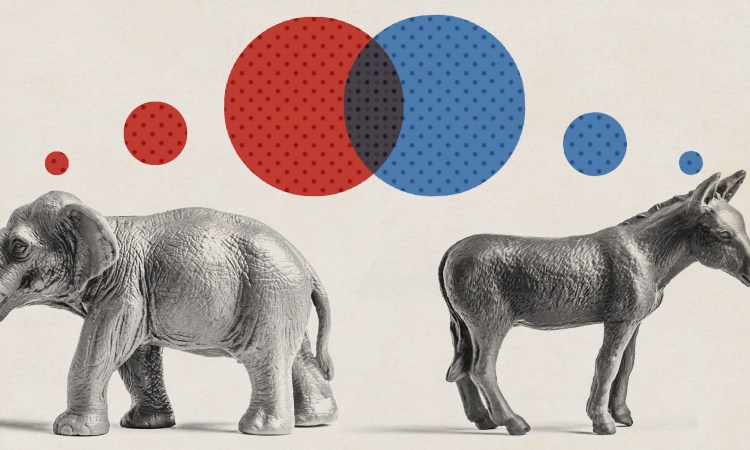
Washington — and America — seem mired in division and dysfunction, but bipartisanship and compromise could exist again in the near future. Journalist Michael Tomasky points out three tiny rays of hope.
I’ve been covering politics for 25 years, and lately, wherever I go in the US, the first question that people ask is “Why can’t politicians in Washington work together?” And that’s followed quickly by their second question, which is “Will this ever change?” I believe the answer to the question no. 2 is yes, although it will take time. To most Americans, our current dysfunction may seem intractable, but I can see three little rays of hope, three developments that could reduce polarization and minimize political and cultural divisions over the next eight years or so. Allow me to explain.
First, there’s a major demographic shift in the US: the growth of the Latino population.
It’s transforming the character of the electorate in key presidential states, most notably in Florida. Florida used to be reliably Republican, because its Latino population was not only small but also primarily Cuban-American. As of 20 years ago, these Cubans tended to be rock-solid Republicans. But that’s all changed in the last decade or so. The state’s Puerto Rican population has risen rapidly, and now the Latinos in Florida are split between Cubans and Puerto Ricans. Puerto Ricans are overwhelmingly Democratic, and polls also show that younger Cuban Americans are much more liberal than their grandparents.
This means that Florida may soon be unwinnable for a Republican presidential candidate. If the Republicans can’t take Florida, they won’t be able to win the White House — there’s very little way for a candidate to reach the necessary 270 electoral votes without it. And Florida could be seen as a harbinger of changes to come in the United States. Texas, with its rapidly growing Latino population, could follow in 2024 or 2028. If that happens, the Republican Party may be forced to open itself to immigration reform, specifically with a path to citizenship. This won’t occur without a bitter fight, but I think it will eventually take place. Interestingly, opposition to immigration reform has been like glue on the far-right, helping hold factions together. But once the glue is dissolved, the party could start to shift on other issues.
Second, win or lose, the Republican Party is at a crossroads because of Donald Trump.
Many members find him unacceptable, and the party is deeply divided over him. If he wins, the divide will probably continue as he attempts to remake the party in his own image. An anti-Trump faction could grow within the GOP to oppose President Trump’s more extreme measures, and this could have a moderating effect on the party over time.
If Clinton wins, that would mean the Republicans have lost three elections in a row. Any time a party has lost three contests in a row, it has had to take a hard look in the mirror. The Democrats were defeated in 1980, ’84 and ’88. After ’88, party leaders said, “All right, we have to move to the center,” and they did so in the person of Bill Clinton.
Of course, the GOP might not do that. Some Republicans — hard-right conservatives in the Ted Cruz school — might try to explain away the loss by saying, “Trump was an aberration; we need a true conservative to run.” That contingent will be vocal and strong. But the opposing argument — that Republicans have become too extreme — should have adherents, too. GOP presidential candidates will probably emerge in 2020 representing both points of view, and we can hope that the forces of comparative moderation might ultimately prevail.
The third ray of hope has to do with the filibuster.
The filibuster is the Congressional rule that allows a minority of senators — just 41 out of 100 — to prevent the Senate from passing a piece of legislation by using obstructive tactics, such extending the debate of a measure by talking on and on. Ending debate requires the votes of 60 senators. In the old days, filibusters occurred rarely, but now they happen all the time. This single rule has been the source of much or even most of the gridlock in Congress; it’s extremely difficult to get 60 senators to agree on anything that’s even remotely controversial. At some point in the near future, I think it’s possible that the Senate will change its rules and reduce the number of votes needed. This has occurred in the past — in fact, the magic number used to be 67, not 60. Or, perhaps the Senate could limit how often this rule of 60 can be used by both parties. If either reform happens, more legislation will get passed, and over time, senators from the two parties will become more accustomed to working together again.
I readily concede that there are reasons to be skeptical about any or all of these three lifelines, but I also believe there’s a decent chance of them happening. Yet even if they do, all will not be roses and group hugs in 2024. Still, the political situation will be better. C.S. Lewis once wrote, “It may be hard for an egg to turn into a bird. But it’s a jolly sight harder for it to learn to fly while remaining an egg.” What we have now is an an egg, and let us hope that in the coming years, we might see the birth of a hatchling which, one day, will fly again.











